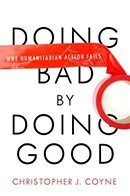A common argument for intervening abroad is to alleviate potential or existing human suffering. Repeatedly, however, state-led humanitarian efforts have failed miserably. Why do well-funded, expertly staffed, and well-intentioned humanitarian actions often fall short of achieving their desired outcomes, leaving some of the people they intended to help worse off? Why are well-meaning countries unable to replicate individual instances of success consistently across cases of human suffering?
Using the tools of economics, Dr. Christopher Coyne’s new book, Doing Bad by Doing Good: Why Humanitarian Action Fails, shifts the discussion from the moral imperative of how governments should behave to a positive analysis of how they actually do. Coyne examines the limits of short-term humanitarian aid and long-term development assistance, the disconnect between intentions and reality, and why economic freedom—protection of property rights, private means of production, and free trade of labor and goods—provides the best means for minimizing human suffering. Join us as experts discuss this hotly debated topic.

